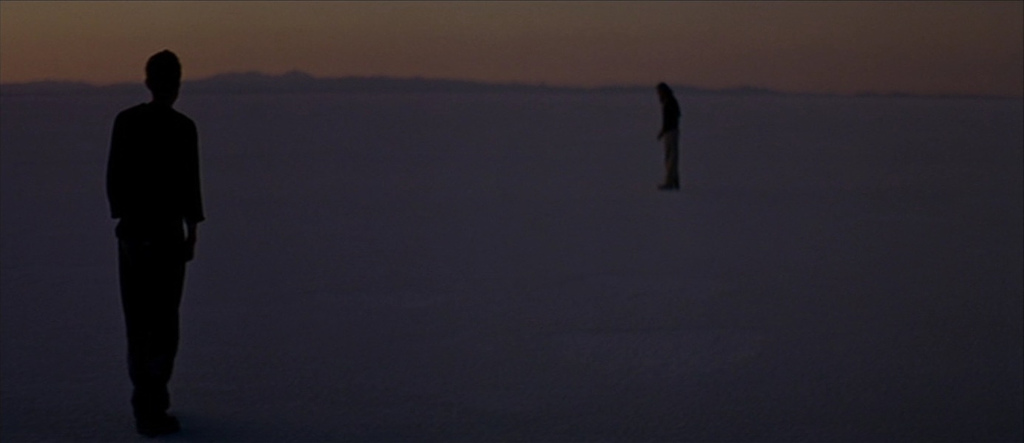
Part two in a series of three pieces by Harry Brewis tackling Gus Van Sant’s Death Trilogy. Click here for part one.
Gerry is about two guys who get lost on a hike in the desert and slowly dehydrate as they try to find a way back. In a moment of mercy, one strangles the other to save them from suffering a much longer and more painful death in the sun. Like with Elephant, the plot is a little thin on the ground, based on a true story the audience probably already knows going in. But the way it’s presented allows it to tell a story with a surprisingly great deal of depth.
Elephant was about characters so trapped in their own way of thinking that they fail to see death coming, or fail to question why they have chosen to kill others. Gerry takes the opposite tack and explores the hidden advantages of living this way.
The dialogue is mostly inane banter between two close friends, whose names we’re never really told (some viewers believe both men are named Gerry, some think it might just be one of them—this lack of clarity is telling about how little their names really matter in the grand scheme of the story). The talk about pop-cultural stuff like Wheel of Fortune or video games in a bored tone of voice. They also use ‘Gerry’ as a shorthand for failure—”We Gerried it”, they often say.
But why are they talking about pointless crap while they’re trying to survive such a desperate situation? Why aren’t they panicking? Well, it’s kind of obvious. They’re trying not to. The dialogue is the characters trying to distract themselves from really encountering the inevitable. Once one of them truly recognizes what is happening, they wordlessly beg their best friend for death. Death is treated not as a horrific surprise (like in Elephant) but as an escape from a far deeper horror: life itself, when its true meaninglessness and the depths of its sufferings are made fully known to its subjects.
It’s a beautiful twist on Elephant, which presented inane preoccupations as akin to being already dead—perhaps these preoccupations are themselves the only way of tolerating life itself. I’ve written before about ‘living in the mall’ , but in Gerry, life outside the mall is almost literally a Hell on Earth.
It is a story that claims video games are a silly distraction from reality, but also essentially says that reality itself is too horrible to ever directly relate to. Taken together, the two films complicate each other’s narratives, both of which openly discuss video games and their surrounding culture, the result being a space where the viewer has to make up their own mind about what they think of life and death.
If you watch Gerry in a dark room, your eyes might start to feel like they’re actually getting sunburnt. There are numerous very long takes of the principle actors trudging slowly as their energy continues to be sapped, and the sun blares endlessly. The camera moves to keep up with them, but landmarks never appear. No film has ever quite portrayed a natural landscape as a hellish place so well, or managed to make the journey through the seemingly neverending wastes seem so pointless and lost. It’s one of the most depressing and difficult to watch films I can think of. Plenty of viewers complained that the film was ‘boring’, and it’s boring in the same sense 2001: A Space Odyssey can bore people. Which is to say: It’s not for everyone. It is for people who want to watch existentialist horror dramas about human suffering and maybe come out of it with a new perspective.
I really like Gerry and Elephant. They almost dare the audience to be okay with not enjoying themselves while watching a film. That said, the real reason I wrote about them was so I could fully explain why the third film, Last Days, is so torturously, hideously bad, on so many levels, that not even I could stand it. Stay tuned.